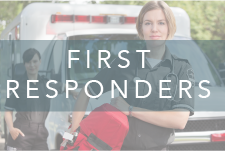Trauma On and Off Duty
- Ben Pearson
- Oct 17, 2021
- 4 min read
Updated: May 12, 2022
First Responders Coping Around the Clock
First responders are in a unique line of duty where they are constantly putting their own wellbeing on the line in the service of others, whether it be putting their physical bodies in danger or compromising their mental and emotional health as a result of traumatic experiences. However, when the time comes to clock out at the end of a long shift. This trauma can still be haunting, impacting a first responder’s home life just as much as their professional one.

Coping with the stresses of trauma on and off duty is an around-the-clock endeavor, and navigating these stresses is complicated. However, learning to distance oneself and create effective barriers is the first step in coping with these unique trials and stresses in a healthy and effective manner.
Trauma on the Job
Trauma is no stranger to first responders. Whether it is a police officer dealing in a high-risk situation with armed suspects, firefighters rushing into a burning building, or navigating debris during a rescue following a natural disaster, traumatic experiences are ever-present. Even seeing injuries others have experienced or hearing about cases of domestic or sexual abuse can carry a profound weight, further affecting a first responder’s mental health.
These traumas are also not isolated events. A first responder can experience a traumatic situation and still be tasked with returning to the field shortly thereafter to continue serving their communities. This can open an individual up to the potential of repeated exposures to traumatic experiences.
The Fallacy of Clocking Out
Clocking out from a shift can hold very little power over one’s emotions. Invasive thoughts of traumatic experiences can continue to pollute one’s mind regardless of if they are on the clock or not, and the stresses of one’s beat can continue to dictate how an individual spends their time outside of work. For some, stress can bring with it the desire to go to the bar and decompress, while others may choose to isolate themselves in defiance of their stress or to hide the extent of the trauma’s effects on one’s health.
Unfortunately, while physically clocking out after a long day is possible, first responders can find it incredibly difficult – even impossible – to mentally clock out from their experiences, making one’s trauma and work a constant stress throughout each day.
Stresses at Home
A safe home environment can help an individual separate themselves from their professional life. However, this isn’t always simple, as there can be any number of reminders of one’s experiences, even while at home. Anniversaries of traumatic events marked on a calendar or news stories of disasters happening in other parts of the country can emotionally and mentally strike very close to one’s own experiences, uncovering buried traumatic feelings, anxieties, or depression. These persistent reminders can make overcoming one’s own experiences a complicated journey, as it can feel difficult to escape from remnants and images of one’s trauma while still being asked to put themselves back on the line the next day and return to duty.
Finding a Coping Strategy
Coping with these feelings 24 hours a day is exhausting, and having strategies in place that can help first responders construct healthy barriers is essential in processing these complex feelings. While one’s experiences and stresses will be unique, there are ways to begin safely decompressing that can be incorporated into one’s routine.
Setting Blackout Times
Scrolling news articles can be stressors on their own, with reports of disaster, crime, and loss populating the pages. These stories can feel constant as they are posted across social media or reported on local or national news outlets. Setting a time each day to power down these electronics and connection to these stressors can be essential in getting a good night’s sleep and providing the mind with the mental respite needed to process its own experiences.
Setting Dedicated Holidays
The trauma of loss can be overwhelming, and a first responder’s proximity to loss and grief can be debilitating. Losing friends or teammates in the line of duty carries a heavy toll that can recontextualize one’s entire outlook, and this grief needs a directed outlet. Having days of the year dedicated to the anniversary of these sacrifices and celebrations of heroism can give these feelings a dedicated and safe space to manifest in solidarity, creating an atmosphere of acceptance and remembrance rather than carrying these burdens under the shallow guise of emotional compartmentalization.
Develop a Personal Hobby
First responders are often tasked with maintaining an image of stoic heroism, protection, and strength for their communities and families alike, and keeping up this visage is exhausting. Having a hobby of one’s own can be a way to allow oneself to be a person, permitting an individual a way to process their emotional needs while distancing oneself from being wholly defined by their on-duty persona.
First responders are still people first, and while they carry a strong demeanor, it cannot come at the cost of one’s personal interests. There should be no shame or guilt imparted on an individual for letting down their guard to pursue hobbies outside of the workplace.




